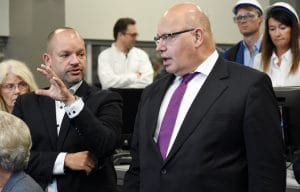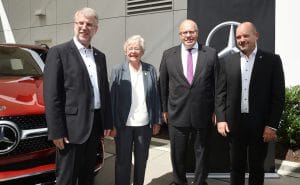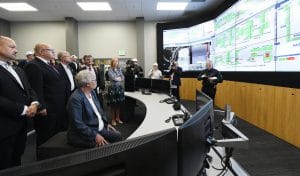
A key German minister swooped into the “deep South” last week to call attention to the huge investment in the State of Alabama by Mercedes-Benz to blunt a renewed push for European tariffs.
The visit to Tuscaloosa, Alabama, by German Minister for Economic and Energy Affairs Peter Altmaier comes at the same time as new reports that the Trump administration is once again moving towards imposing tariffs on European-made goods, including vehicles.
The trigger for the speculation in the international press is the moves by European countries to tax the products of U.S. tech and Internet companies such as Facebook and Google. The U.S. has threatened to retaliate if the Europeans, long wary of the influence of U.S. tech giants, follow through on the threats to impose new taxes on U.S. companies.
In addition, while the Trump administration said this spring that it would not impose any tariffs on vehicles made in Asia or Europe for at least six months, using a study that suggests foreign made cars are a threat to U.S. national security.
As in the case with China, the administration’s trade negotiators in Europe appear of have made little headway and the six-month truce on autos is passing quickly, prompting the speculation that tariffs are again on the table.
(Trump Trade Wars Could “Backfire,” Hitting American Jobs)
Trump and his political advisers believe that trade and tariffs remain a winning political issue as the 2020 election approaches.

Altmaier, a senior member of Chancellor Angela Merkel’s cabinet, underscored German the scope of German investment in the U.S. during his visit to Tuscaloosa where he toured the Mercedes-Benz assembly plant with Alabama Governor Kay Ivey and Mercedes-Benz executives, including Joerg Burzer, the head of Mercedes-Benz Cars, Production, who came from Germany for the event.
“The Mercedes-Benz factory in Tuscaloosa is an impressive example of how German companies are generating growth, jobs and innovation in the U.S. I’m particularly impressed by the latest investments of $1 billion to promote electric mobility and construct a battery factory,” Altmaier said.
Since 1995, Mercedes-Benz Cars has invested more than $6 billion in the Tuscaloosa plant. The announcement of the investment of another $1 billion in 2017 marked the start of the company’s expansion of its industrial involvement in the region and is a clear commitment to the Tuscaloosa location, the company suggests.
(WTO Likely to Shoot Down Trump’s “National Security” Tariffs)
The investment is allocated to the production of electric SUVs of the EQ product and technology brand and to the construction of a battery factory. This includes a Global Logistics Center as well as an after-sales hub for the export of spare parts.

“Mercedes-Benz Cars has laid the foundation for the automotive industry in Alabama and in doing so had a significant impact in its industrial transformation. We created thousands of highly qualified jobs by building our Mercedes-Benz plant in Tuscaloosa more than 20 years ago.
“With our additional investment of one billion US dollars announced in 2017, we are putting the Tuscaloosa plant on a viable and sustainable foundation – beginning with building a battery factory and extending to the future production of electric SUVs of the EQ product and technology brand. The visit by (Altmaier) underscores the significance of the Mercedes-Benz plant in Tuscaloosa for the German-American economic relations,” Butzer said.
When the plant was built in 1995, it was the first major Mercedes-Benz plant outside Germany. The location has been continually expanded over time. By building the plant there, Mercedes-Benz Cars has played a key role in the development of Alabama into a location of the automotive and supplier industry. Establishing the Mercedes-Benz plant in Tuscaloosa resulted in automotive suppliers, other carmakers and other supporting companies settling in Alabama as well.
(Daimler Investing $1B in U.S. Plant to Electrify SUVs)
Mercedes-Benz U.S. International is the second-largest exporter of automobiles in the US. Since the start of production, more than 3.2 million vehicles have been produced at the Tuscaloosa plant.







